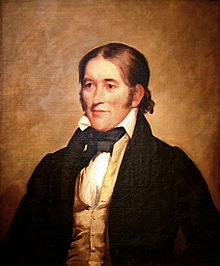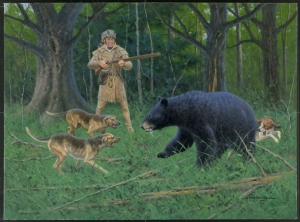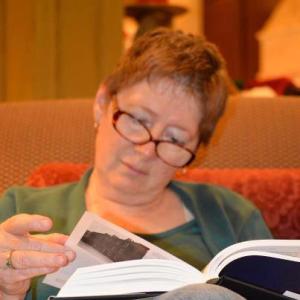.
.
David Crockett
Don’t call him Davy.
David’s political enemies called him “Davy” to make him seem boyish.
They never convinced anybody.
Dying at the Alamo was just the final scene in David’s dramatic and impressive life.
David Crockett was six-foot and handsome, an expert shot with his rifles (he always named them “Betsey”), a three-term U.S. congressman and an American folk hero who wrote a popular memoir titled A Narrative of the Life of David Crockett, of the State of Tennessee.
He grew up in the wilderness, could hit a target at two hundred yards and specialized in hunting bear.
He also fought in the Creek War, serving with the Tennessee Mounted Volunteer Riflemen, and served in the War of 1812.
Because the military failed to provide supplies, David did tend to drift in and out of the ranks while searching for food.
“It was root hog or die,” Crockett said in his autobiography.
Best of all, David was a “truly honest man,” according to biographer William C. Davis, in Three Roads to the Alamo: The Lives of David Crockett, James Bowie and William Barret Travis.
“..there was no true guile in the man. He was exactly as he seemed: He said what he thought and meant what he said,” Davis wrote, later adding, “His conscious demanded he stand for right.”
Crockett himself repeatedly wrote, and said, “Be always sure you’re right–THEN GO AHEAD.”
Although he did exaggerate his backwoods style for the voters, Davis said Crockett “projected a basic and genuine gentility,” and “good cheer.”
Like many other American heroes, David came from a humble background.
He was descended from a Scot family who immigrated to America in the early eighteenth century and settled on the frontier, in what was then North Carolina.
In 1778, David’s grandparents paid for living on the frontier when a Creek, or Chickamauga, war party attacked their farm, killing them, wounding one son and kidnapping another.
Joseph Crockett, David’s father, (who fought in the American revolution) escaped the Indian attack because he was already married and living on his own.
David was born August 17, 1786, in his father’s log cabin, but ran away when he was thirteen and spent years taking care of himself.
That didn’t leave much time for school.
But David was always ambitious and when he returned home, he made a bargain with a local schoolmaster. The teacher would give him reading and writing lessons in return for David’s work.
The arrangement was a success, although Crockett was never a good speller.
When he was twenty, David married Polly Finley and they began farming.
However, the couple was forced to keep moving west because David was both restless and a poor farmer. He had to hunt to feed his family and lost several properties to tax delinquency and debt.
During these endless moves, the couple had three children.
They weren’t destined for happiness. Polly died and it broke David’s heart.
Polly’s death was “The hardest trial which ever falls to the lot of man,” David said in his memoir.
His children would either have to be farmed out to relatives or he would be forced to marry again, David wrote, so he proposed to a widow, Elizabeth Patton.
The couple was not happy and eventually separated.
But, Crockett was good at something other than farming.
Getting along with people was easy for him. They found him charming.
When he was living at the head of Shoal Creek, three miles west of Lawrenceburg, Tennessee, his fellow citizens nominated David for Justice of the Peace and the state legislature approved their choice.
After that, he was elected to local offices, then to the state legislature.
Both in the state legislature and U.S. Congress, David proposed laws to help his fellow frontiersmen, especially laws designed to help them obtain ownership of land on which they settled and improved.
A week after taking office in the state legislature, Crockett cast his first vote to relieve heavy penalties on people owing overdue property taxes.
This issue was one with which David could personally sympathize.
Reforming land grant law was another pet issue. He believed a few men were monopolizing the best property.
Crockett did not work well with other legislators. He made “Independence his personal religion, recklessly unmindful that religions have a way of creating martyrs,” Davis wrote.
But by the time Crockett ran for Congress, something new was happening in American culture.
People no longer identified with the founding fathers and wanted to see themselves in a different kind of man; a Western man, a frontiersman, a self-made man.
David Crockett was that man.
First they began calling him one of the “Lions of the West,” then they identified him with the character who trod the stage in “The Lion of the West; or, A Trip to Washington.”
After that, he was the celebrity of the age. David couldn’t go anywhere without being asked for his autograph. A book was written about him, he was invited to speak, he toured the East Coast and was toasted in every town.
Uninvited visitors showed up at his Washington hotel room and he showed them what they expected to see; the frontiersman who could whip his weight in wildcats and ride alligators.
“Well!–they came to see a bar (bear), and they’ve seen one–hope they like the performance–it did not cost them anything any how,” David told a friend, after one such visit.
An aspiring author wrote a book about Crockett, but it was so inaccurate that he decided to write his own book to set the record straight (and make some desperately-needed money).
That’s when David wrote his Narrative, which was the most popular book of the time.
After that, however, Crockett’s life went downhill.
His constant attacks on Andrew Jackson wore thin. David called him “King Andrew.” And he just got tired. He was never cut out for politics.
Then Jackson went after him in the 1835 Congressional election, supported an opponent against him, and David lost by 252 votes.
That’s when David said to hell with the voters, he was going to Texas.
He took his rifle, his fiddle and a few friends, and headed west.
According to one letter writer, when David stopped in Texas towns, people sensed he would not be seen again.
Crockett was himself prophetic in a letter he wrote to his daughter, “Do not be uneasy about me I am with my friends,” he wrote.
“I am rejoiced at my fate.”
————
——————
Click below to purchase one of Julia Robb’s page-turning historical Texas novels:
CLICK HERE FOR YOUR
DAVID CROCKETT BUMPER STICKER

